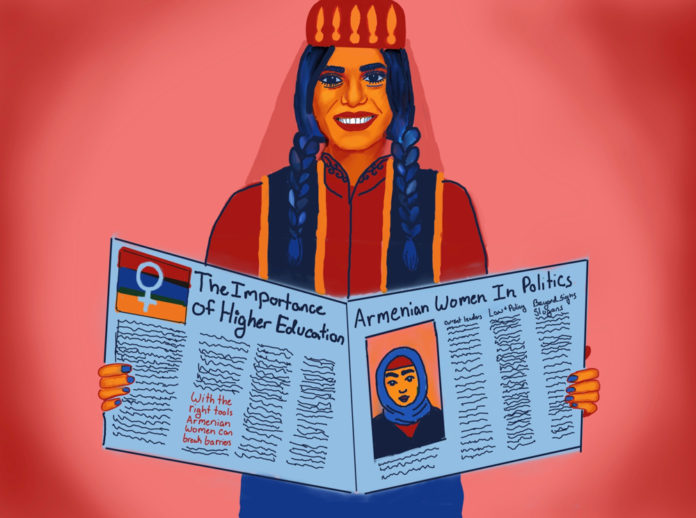Feminism is more than raising a poster with a feminist slogan and more than a t-shirt that says “feminist.” Feminism is about women breaking barriers and enacting change within their cultures. It’s about women taking action to overcome sexism, like my Armenian women have, instead of solely talking about it.
Thanks to Armenian women who have crossed boundaries in our culture, I now understand true feminism, and I’ve realized we need to reevaluate America’s feminist movement. At a conference I attended March 9, “Armenian Women Breaking Barriers,” Armenians spoke of these women who challenged cultural norms pre- and post-Armenian genocide and in the present day. This event was part of the Armenian Youth Federation and the United Human Rights Council’s “Project Ser,” which aims to promote gender equality in traditional communities such as my Armenian community.
When people think of feminism, many only imagine American feminism. However, feminism looks different around the world, since women from all different cultures and traditions have overcome distinct challenges. Often, oppressive practices are confused with traditions. Typically, when a bride walks out of her house the day of her wedding, she is surrounded by her family, soon-to-be family and friends. Unlike this positive wedding tradition, arranged marriage was an oppressive reality in the 19th and 20th centuries, as Houri Berberian, an Armenian Studies professor at University of California Irvine, explained. According to Berberian, the bride and groom did not meet each other until the wedding. Then after a bride and groom would marry, it was common for women’s mouths to be taped to inhibit speaking or eating in front of her husband’s family — a barrier for speech, communication and self-value.
Recently, as part of a European Union program, Armenia intended to pass a law called “Prevention of and the Struggle against Domestic Violence,” which would strengthen measures to prevent domestic violence and provide services for victims. However, Arman Boshian, the founder of the Pan-Armenian Parents’ Committee, complained that this was “very dangerous,” and that it was a European attack on Armenian family values.
Meanwhile, about 60 percent of Armenian women reported that they experienced domestic violence at least once in their lives. According to Berberian, some Armenians believed people who supported gender equality “ruined Armenian traditions.” Berberian also explained that victims were coerced into marrying their rapists to protect their “family honor,” and that divorce was prohibited and seen as a “passion for bestiality.”
Armenian women’s suffering and oppression infuriates me. Instead of repeating meaningless slogans about how “cool” women are, we need to focus on telling the powerful stories of these marginalized women. Many Armenian women and other immigrant women have immigrated to America to escape oppression, but we need to acknowledge the issues they face in American society and their significance in the feminist movement.
Mari Manoogian, one of the speakers at the March 9 event, is the great-granddaughter of Armenian genocide victims, the youngest woman serving in the 100th legislature and, most importantly, the first Armenian-American woman to serve in the Michigan House of Representatives. She did not stay home and raise the children while her husband traveled for work and showed up occasionally; instead, she earned a higher education and fought for a government position. Armenian gender norms said that women did not have a role in the workplace, especially in government, but she was able to challenge those norms. After Manoogian came on stage, the elderly Armenian women applauded her and yelled things like “bravo” in their Armenian accents. I felt their pride in the strong young women of today — in the Armenian women they were not allowed to be. Her story was unheard of to these women. Barrier broken.
Siran Zarifian, known as Seza, pursued her college education at Columbia University and then returned to Beirut, Lebanon. Already challenging a norm by receiving a college education, Zarifian also started her own periodical called “Yeridasart Hayuhin,” or “Young Armenian Woman.” In the periodical, she asserted her voice by writing about her own experiences as well as those of other Armenian women. Traditionally, women would not dare to be public about their oppression. Barrier broken.
Now, imagine if these women went about feminism the way the current white feminist movement does in the U.S. — with ignorant ideas of feminist sisterhood and shirts with empty, snappy slogans. That’s what aggravates me. There are whole histories in different cultures and communities, but people do not understand or connect to them. We need to be more critical about the content we promote, and the current American feminist agenda needs to include diverse experiences of feminism.
As an Armenian woman, I am breaking barriers by writing this piece about the oppression of my women, as Seza would. I am breaking barriers by being an Armenian woman in higher education on track to graduate college. The Hayuhiner (Armenian women) who have broken barriers before, the ones who continue to break barriers now and the Mayrig (mother) who raised me all inspire me to keep breaking barriers. Let’s keep breaking barriers together.
Serena Pelenghian is a sophomore Critical Theory & Social Justice major. She can be reached at spelenghian@oxy.edu.
![]()































